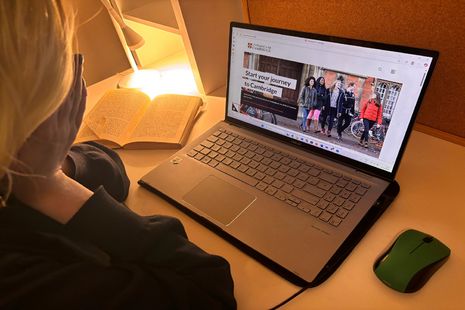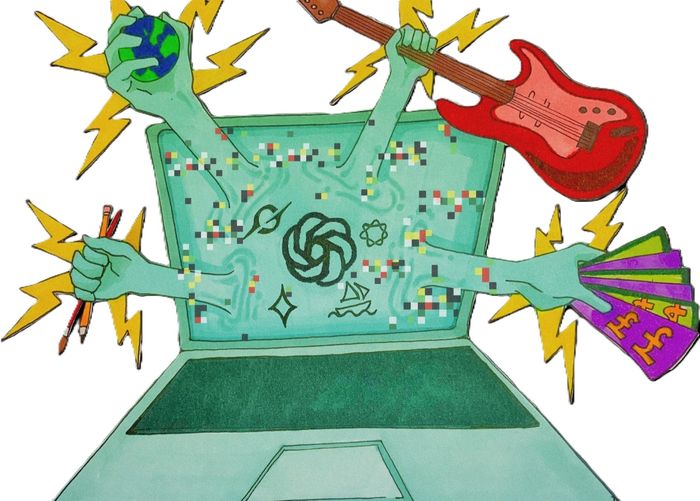Reflections on the August Reconsideration Pool
Elsie McDowell explores initial Cambridge rejection, imposter syndrom, and adjusting to university with students who received their offer through the August Reconsideration Pool

Two days after my A-Level results day I received a call that would change the trajectory of life. A college I had never heard of was offering me a place to study a course I’d convinced myself I wouldn’t have enjoyed at a university that I had decided wasn’t for people like me.
Along with at least 70 students each year, I received my offer through the August Reconsideration Pool, a Clearing-style process for students who meet at least three of the University’s “widening access criteria” and did not receive an offer in the winter pool. These criteria are based on a mix of postcode- and school-based deprivation markers, or being a refugee or care-experienced.
A University spokesperson stated that “we are proud of the positive impact the August Reconsideration Pool continues to have in welcoming students who may not have been able to demonstrate their full potential via the standard entry process – some because of educational disruption or disadvantage – but have gone on to achieve highly in their A-level exams.”
“The whole thing felt so surreal”
On results day, a list of courses with places left is published by the University. In 2023, of the 1605 applicants who were originally eligible for the August Reconsideration Pool, some 277 elected to have their application reconsidered after meeting the grade requirements for the course they initially applied to.
Daisy Bates, now a third year English student at Robinson, describes the process of getting an offer as “overwhelming”. “I got the phone call at 7pm while playing the Sims,” she tells me. “The whole thing felt so surreal, I think I kept playing!”
In line with what she jokes is an “awful stereotype,” Daisy had an offer lined up at Durham. She had made plans with other freshers for move-in day, and when visiting, “the city really felt like home”. The decision was far from an easy one, and she describes having to “completely rewire [her] brain” after “months of convincing [her]self that Cambridge wasn’t for [her]”.
“I think I accepted my offer in ten seconds!”
Although she notes that some of her friends suggested rejecting her offer as “payback” to Cambridge, she did seriously consider turning it down. I too found the decision a difficult one to make. Had I taken up my offer at Bristol, I would have studied Politics and Spanish. For me, the choice came down to weighing up how much I valued being able to study a language as opposed to having the experience and prestige of Cambridge but with the more rigid structure of HSPS. Indeed, of the 117 offers made in 2023 ten were turned down.
For Rahan Chowdhury, now a third year engineering student at Lucy, the decision was an easier one, describing the day he received his offer as “still probably the best day of [his] life”. “I think I accepted my offer in ten seconds!”
Having been rejected from the other universities that he had applied to, Rahan was planning on taking a gap year. As he had spent months under the impression that he had an additional year to prepare for university, he was “in this mindset that [he] could just forget everything”. As a result, he found the academic load of Michaelmas hard to adjust to, and no matter how hard he worked for the rest of the year, “it wasn’t enough”. But, two years on, he feels that this experience allowed him to develop an “insane work drive” and would not change the way he received his offer.
“Every other person I know who got in through the ARP said its no different to being a normal offer holder”
Keane Hadley found that the ARP contributed to his feeling out of place socially more than academically. Now studying HSPS at Peterhouse, he cites not attending his college’s offer holder day as making it harder for him to acclimatise to Cambridge jargon. But, by his second term, he “felt just as comfortable as everyone else”. He also stresses that although the ARP was associated with some additional imposter syndrome, coming from a working class background would have augmented feeling like an “outsider” regardless of how he had received his offer.
Other students have more ambiguous feelings about the system itself. One former HSPS student at Lucy who wished to remain anonymous, expressed concern with the limitations of postcode-based widening access. When they were eligible for the scheme in 2020, they felt “uneasy” that their offer was being reconsidered, when those of some of their “equally talented friends” were not. “It’s hard to make a call on the challenges someone has to overcome based on their postcode,” they told me. However, they still emphasised their support for the scheme: “It’s a move in the right direction, even if it isn’t perfect.”

Is AI really killing the graduate job market?
All interviewees noted that the August Reconsideration Pool did not come to define their Cambridge experience. Keane related how, after “a more difficult first term,” he has had “broadly the same experience as most people”. Despite initially having “this nagging fear that it was a pity offer, based on my contextual circumstances and not academic merit,” Daisy found that after she had received her Part I results, “[she] felt confident [her] admission hadn’t been an error”. Rahan emphasised that “every other person I know who got in through the ARP said it's no different to being a normal offer holder.”
Cambridge admissions are a complicated and at times seemingly arbitrary process that inevitably produces unfair rejections. If I could tell my fresher self one thing, it would be that however you received your offer, it is yours, and that cannot be taken away.
 News / Judge Business School advisor resigns over Epstein and Andrew links18 February 2026
News / Judge Business School advisor resigns over Epstein and Andrew links18 February 2026 News / Hundreds of Cambridge academics demand vote on fate of vet course20 February 2026
News / Hundreds of Cambridge academics demand vote on fate of vet course20 February 2026 News / Petition demands University reverse decision on vegan menu20 February 2026
News / Petition demands University reverse decision on vegan menu20 February 2026 News / CUCA members attend Reform rally in London20 February 2026
News / CUCA members attend Reform rally in London20 February 2026 News / Gov grants £36m to Cambridge supercomputer17 February 2026
News / Gov grants £36m to Cambridge supercomputer17 February 2026









